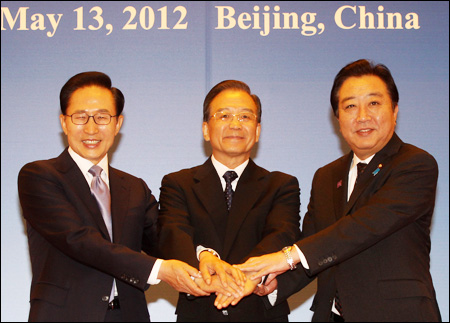Seoul, Beijing, Tokyo to start FTA talks

President Lee Myung-bak, left, China's Premier Wen Jiabao, center, and Japan's Prime Minister Yoshihiko Noda hold hands as they pose for photographs ahead of the fifth trilateral summit in Beijing, Sunday.
Three leaders warn against NK’s provocations
The leaders of South Korea, China and Japan agreed at a summit in Beijing Sunday to launch negotiations for a three-way free trade agreement (FTA) this year, raising hopes that the move will bring new momentum to trilateral cooperation.
“The three countries have agreed to launch formal negotiations on the FTA by the end of this year,” said Chinese Premier Wen Jiabao at a joint press conference with President Lee Myung-bak and Japanese Prime Minister Yoshihiko Noda following the summit.
“Northeast Asia is the most economically vibrant region in the world. The establishment of a free-trade area will unleash the economic vitality of the region and give a strong boost to economic integration.”
President Lee underscored that the importance of the three-way FTA, saying it would play a positive role not only for the world economy, but also for peace and prosperity in Northeast Asia.
“Reaching a general consensus to launch the South Korea-China-Japan FTA by the end of this year is the biggest result we achieved through this summit,” said Noda.
North Korea was also high on the agenda as the talks came a month after Pyongyang’s launch of a long-range rocket and amid growing signs of it preparing to conduct a third nuclear test.
“We exchanged views on the launch of North Korea’s new leadership, its rocket launch and related developments,” Lee said. “We appreciated the U.N. Security Council’s strong and swift presidential statement (on the launch) and agreed that additional provocations were unacceptable.”
Wen also stressed that the “most urgent issue for now is to prevent tensions on the Korean Peninsula.”
The failed launch on April 13 drew strong criticism from the international community, including China, the reclusive North’s closest ally and main benefactor. The rocket, which Pyongyang claimed was carrying a satellite, exploded a few minutes after liftoff.
On the sidelines of the summit, the three countries also signed a trilateral investment agreement to further strengthen their economic partnership. The treaty calls for providing most-favored-nation status and other protective measures for investments from each other.
The pact — the first economic treaty between the three countries — is expected to benefit both South Korean and Japanese companies by ensuring better protection of intellectual property rights in China.
Trade between the three accounted for 17.6 percent of total global trade in 2010, up from 14.5 percent in 2005. The volume of the South’s trade with China and Japan accounted for 30.5 percent of its total trade volume in 2009, a 10 percentage point increase from the 1990s.
The Korea Development Institute, a state-run think tank, expects South Korea’s gross domestic product and exports to increase 3.38 percent and 6.77 percent, respectively, once the trilateral FTA comes into effect.
Japan is eager to kick off the three-way talks at an early date as it is wary of the possible launch of a bilateral FTA between South Korea and China, analysts say.
Seoul and Beijing earlier agreed to start talks, and the first round of bilateral negotiations is scheduled for today in Beijing.
Insiders say Seoul, unlike Tokyo, wants the South Korea-China deal to be finalized prior to the signing of the trilateral pact because this would give its firms the upper hand in the Chinese market.
However, a tough road lies ahead over the negotiations because the three nations have different viewpoints in the level of free trade.
China insists on a partial opening of its services market and intellectual property sector, while Japan is pushing for full interaction including finance and services. Japan is also sensitive to importing agricultural products along with Korea.
Kim Young-gui, a senior researcher of the Korea Institute for International Economic Policy, noted that the trilateral FTA may turn out to be not as effective as anticipated because it will be very challenging for the three nations to reach a consensus.
“The level of free trade can be extremely low compared to bilateral agreements,”he said.
“However, in terms of regional stability in Northeast Asia, a Korea-China-Japan FTA is essential.”
Tokyo recently expressed an interest in actively joining the United States-centric Trans-Pacific Partnership (TPP) talks.
The TPP is a multilateral free trade agreement negotiated among nine countries including the United States Australia and Singapore. Korea and China are not part of the TPP talks.
This year marks the 20th anniversary of the establishment of diplomatic ties between South Korea and China, and the 40th anniversary of normalization of relations between China and Japan. <Korea Times/Chung Min-uck>






















































